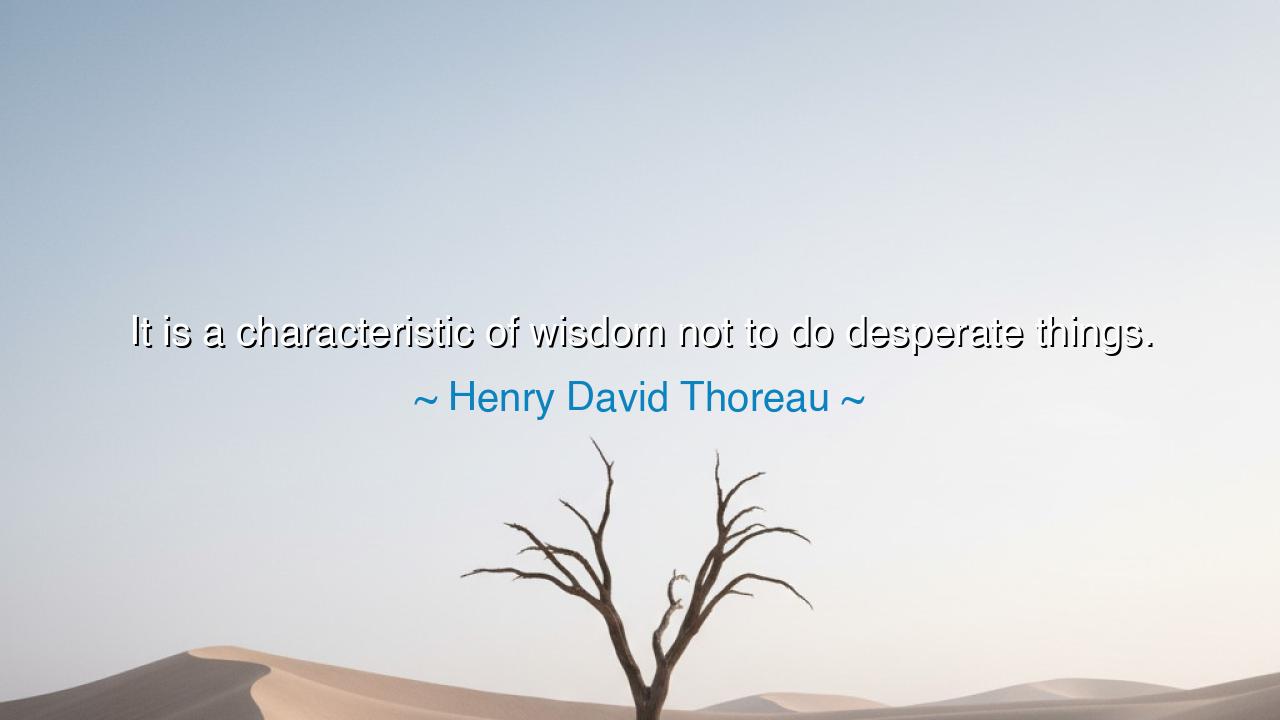
It is a characteristic of wisdom not to do desperate things.






Wisdom is like a calm river, steady and deep, never rushing wildly even when the storms rage above. When Henry David Thoreau declared, “It is a characteristic of wisdom not to do desperate things,” he spoke of the sacred balance of the soul. In times of fear or uncertainty, the unwise are driven to desperation, acting rashly, grasping for solutions without thought. The wise, however, remain composed, seeing clearly even through chaos. True wisdom does not thrash against the currents of life but flows with patience, choosing action with clarity rather than panic.
This teaching reflects the core of Thoreau’s philosophy. Living a life of simplicity by the shores of Walden Pond, he observed nature and human society, seeing how haste and frantic desire led to suffering. To act desperately, he believed, is to abandon reason and harmony. Just as a tree stands firm through wind and rain, so too must the wise soul endure trials without succumbing to reckless impulses. In Thoreau’s view, desperation is the mark of a heart ruled by fear, while serenity is the mark of one ruled by understanding.
History provides vivid examples of this truth. When the Roman Republic faced invasion by the mighty Carthaginian general Hannibal, many Roman leaders demanded hasty, desperate measures to defeat him. But Fabius Maximus, known as the “Cunctator” or “the Delayer,” chose patience and strategy over reckless battle. Though mocked for his caution, his calm, measured approach ultimately saved Rome. Had he acted desperately, Rome might have been destroyed. His story proves that restraint, though often misunderstood, is sometimes the greatest act of courage.
On the other hand, desperation has brought ruin to many. During the final days of Nazi Germany, Adolf Hitler made frantic, illogical decisions, driven by fear and delusion. His desperate acts hastened the collapse of his empire and multiplied the suffering of his people. In this, we see how desperation blinds the mind, leading not to salvation, but to destruction. The contrast between calm wisdom and frantic despair could not be clearer.
In our own lives, this lesson whispers to us daily. When faced with hardship—whether in work, relationships, or personal struggle—the temptation to act immediately and recklessly is great. Yet Thoreau urges us to pause, to breathe, to see beyond the storm. Wisdom is found not in the loudness of action, but in the quiet strength to wait, to plan, and to trust in the unfolding of time.
Let future generations carry this teaching as a lantern through dark times: desperation is a shadow, and wisdom is the light that dispels it. When the world presses in and fear threatens to consume you, stand firm. Act not from panic but from purpose. For the wise know that calmness is the mother of victory, and that even the mightiest tempest can be endured by a soul at peace.






DHDung Hoang
In leadership crises, slogans about calm are easy; dashboards flashing red are not. How can teams honor steadiness without drifting into analysis paralysis? I’d like concrete mechanics: predefine no-regret actions that can start immediately, set a time-boxed investigation window, assign a rotating skeptic to challenge momentum, and use stop-loss thresholds that trigger an automatic pause. Afterward, hold a blameless postmortem to refine playbooks. What leading indicators show we’re balancing composure and speed—near-miss trends, recovery time, or stakeholder trust scores?
ULHuynh Ngoc Uyen Linh
I’m craving a practical cool-down routine for ordinary life—money stress, relationship conflict, career choices. What’s a minimal protocol that shrinks the chance of rash moves? Maybe: breathe for one minute; write the smallest solvable slice of the problem; define a “good enough” outcome; generate a 24-hour option and a 30-day option; call one disinterested advisor; sleep on it if the decision isn’t time-critical. I’d also love relapse prevention: a personal list of triggers that make me lurch, plus prewritten scripts to buy time.
TTTuyet Mai Tran Thi
There’s an ethical wrinkle: restraint can be wise for the comfortable but harmful for those facing urgent harm. When does caution become complicity? I’d value criteria that separate principled calm from bystander passivity—say, assess power dynamics, time sensitivity, and the cost of delay to the least protected person. If waiting increases irreversible damage, shouldn’t readiness tilt toward swift intervention? I want a framework that honors composure while insisting that steadiness serve justice, not merely personal serenity or reputational safety.
GNNguyen Gia Nghiem
As a reader, I want a way to tell decisive bravery from panic disguised as boldness. Deadlines and uncertainty can make any option feel like the last lifeboat. Could you propose a compact decision rubric? For example: check your physiological state; restate the actual objective; list at least three viable paths; mark which moves are reversible; run a two-minute pre-mortem on your top choice; then act at the lowest risk level that still advances the goal. I’m looking for something small enough to use under pressure, yet strong enough to prevent flailing.